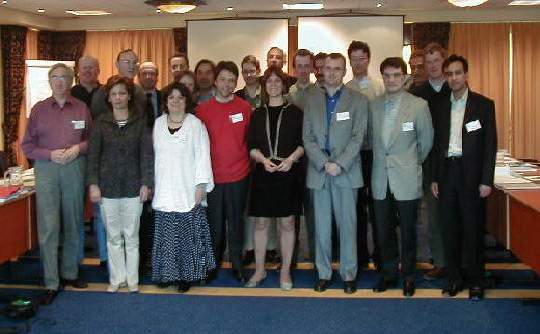Non-Invasive positive Pressure Ventilation (NIPPV) in Amyotrophic Lateral Sclerosis (ALS)
- Number 106
- Date 3 May 2002
Location: Naarden, The Netherlands
21 participants from France, Germany, Italy, Portugal, The Netherlands, and the United Kingdom met in Naarden on 3-5 May 2002. This was the first meeting of the European Amyotrophic Lateral Sclerosis (ALS) Consortium under the auspices of the ENMC. The aim of the Consortium is to develop collaborative research into the causes, consequences, and treatment of ALS, and thus to raise standards of care for people with ALS throughout Europe. The Consortium has previously surveyed non-invasive positive pressure ventilation (NIPPV) in Europe, and found large differences in clinical practice. Although there is evidence suggesting that NIPPV both prolongs survival and improves quality of life, there are as yet no published prospective, randomised trials on the efficacy and tolerability of this intervention in ALS. The aim of the meeting, therefore, was to agree on a common approach to prospective and randomised studies of NIPPV. The group comprised neurologists and respiratory physicians involved with research into respiratory problems in ALS patients, as well as experts in statistics, clinical trial design, and health economics. The MND Association was also represented. The group agreed in deciding how respiratory muscle strength should be assessed, and in defining practical criteria for starting NIPPV. There was agreement that randomised studies are needed to demonstrate efficacy for survival and quality of life if there is to be equity of access and funding. The group agreed on two options for trial design, and outlined the primary and secondary efficacy measures, power calculations, and statistical approaches to data analysis. The first option was a trial of early NIPPV versus current 'standard' practice. The second was a randomised trial of NIPPV versus no NIPPV. It was recognised that this option might not be feasible in some countries where NIPPV is accepted treatment. A third option for non-randomised prospective studies was discussed briefly. In summary, the workshop was helpful in crystallising a consensus on the investigation and management of respiratory failure in ALS. The draft protocols will be discussed with the European ALS Consortium in June 2002 at the European Neurological Society (ENS) Meeting in Berlin. Overall this was a very enjoyable, creative and fruitful workshop that will lead to new collaborations and contribute significantly to advancing the field and improving patient care.
A full report of the meeting will be submitted for publication in Neuromuscular Disorders
Prof. J. Moxham and Prof. N. Leigh (United Kingdom)

ENMC
Lt. generaal van Heutszlaan 6
3743 JN BAARN
The Netherlands
+ 31- 35-5480481
enmc@enmc.org
